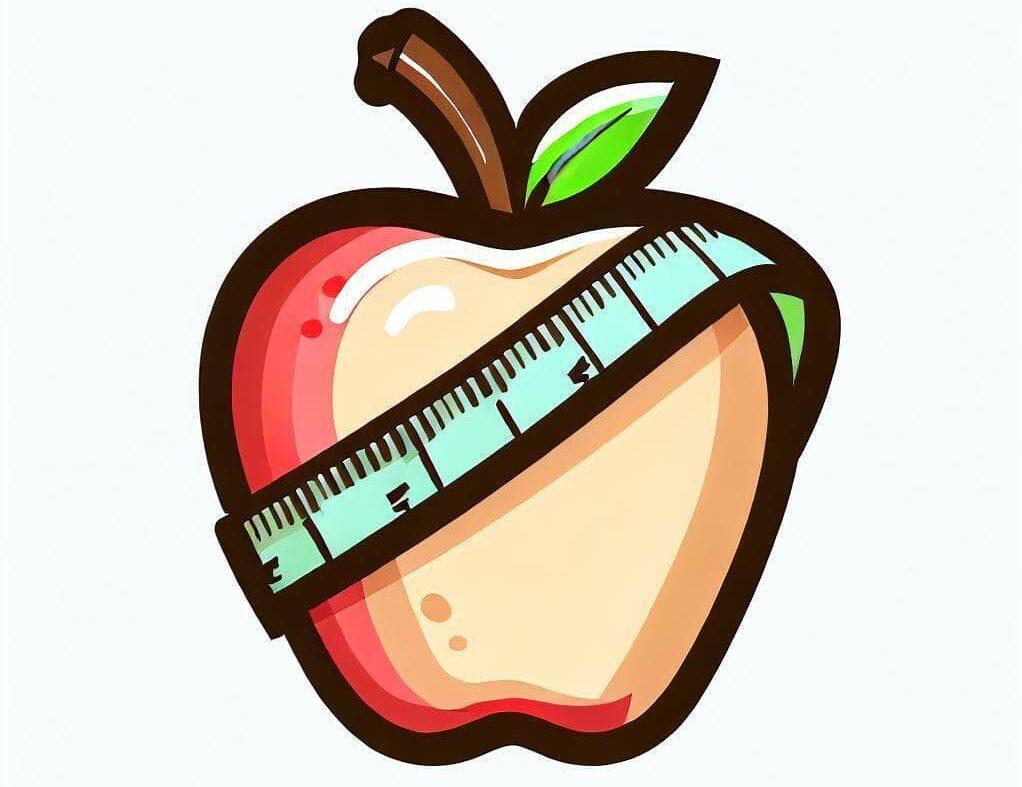Is Watermelon Good For Weight Loss?
This post may contain affiliate links which means I may receive a commission for purchases made through links at no extra cost to you. See my disclosure policy for more information.

“Is watermelon good for weight loss?” Yes, watermelon is good for weight loss primarily due to its low-calorie content and high water content, which makes it both filling and hydrating.
I gotta admit, I really like watermelon myself. It’s sweet and full of water, making it a great snack, especially after spending time in the sun.
I get it when you wonder if eating watermelon will make it hard for you to lose weight.
Let me give you the full rundown of the benefits and downsides of eating watermelon for weight loss.
Nutrition Value of Watermelon
As per the USDA, 1 cup of diced watermelon contains the following nutrients:
Serving Size: 1 cup (152 g)
Calories: 45
Protein: 1 g
Carbs: 11.5 g
Sugar: 9 g
Fiber: 0.6 g
Fat: 0.2 g
Potential Benefits of Watermelon for Weight Loss
It Has a Low Glycemic Load
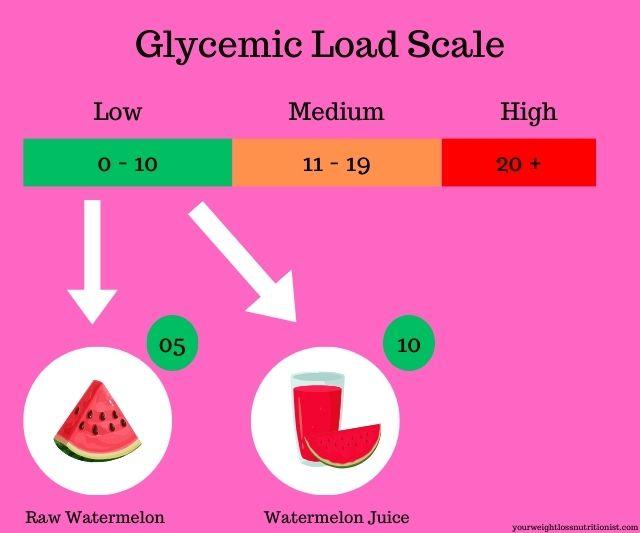
While many people often concern themselves with a food’s glycemic index (GI), a more accurate measure of how a food impacts blood sugar is its glycemic load (GL).
The glycemic load takes into account both the quality (GI) and quantity (amount of carbohydrates) in a food.
This makes it a more practical measure of understanding how the food you consume might affect your blood sugar.
Watermelon has a high glycemic index of 80, which might initially raise eyebrows.
However, because the actual carbohydrate content per serving of watermelon is relatively low, its glycemic load is much lower at about 5.
This means that when consumed in reasonable portions, watermelon is unlikely to cause significant spikes in blood sugar levels.
It is a Low-Calorie Fruit
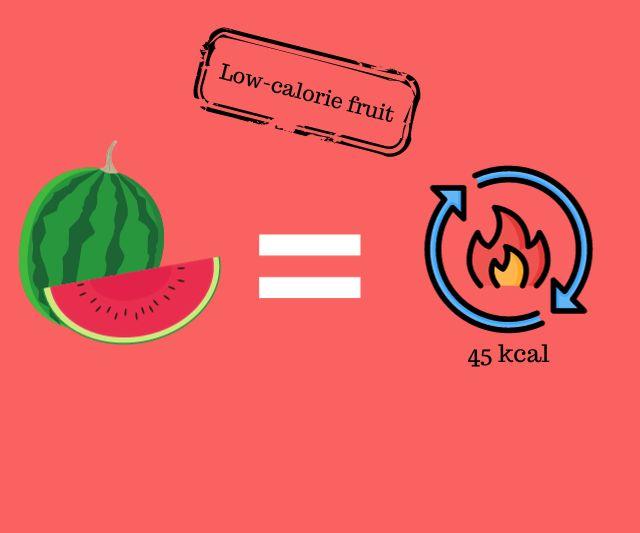
Watermelon has a low-calorie content, making it your fruit ally when trying to lose weight.
Every gram of carbohydrate provides about four calories.
Considering that a large portion of watermelon is made up of water, the actual calorie content becomes even more diluted.
For comparison, a cup of diced watermelon contains roughly 45 calories, which is considerably lower than other high-carb fruits like bananas which have 105 calories per 1 medium-sized banana.
By consuming low-calorie foods, you can eat larger volumes and feel satiated without going over your daily calorie limit.
High Water Content
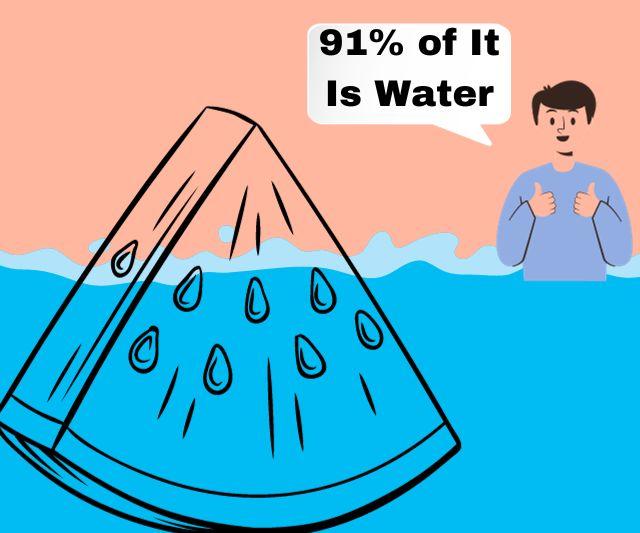
Watermelon is made up of 91% water. Guess that’s why it’s not called ‘drymelon’, right? It’s literally a melon filled with water.
Foods with high water content can help you with hydration and satiety.
When you eat foods that are rich in water, like watermelon, they help you feel full without adding many calories to your diet.
This feeling of feeling full can help curb your hunger and make you eat less during your main meals.
Let’s say it’s the middle of the day and you are getting hungry. Instead of grabbing chips or a granola bar, you choose to eat some sliced watermelon.
Because watermelon has a lot of water, it makes you feel full fast, and your brain thinks you’re not hungry anymore.
So, by lunchtime, you won’t be as hungry as if you ate something less satisfying like processed snacks.
Ideal as a Pre-Workout Snack Due to Its Citrulline Content
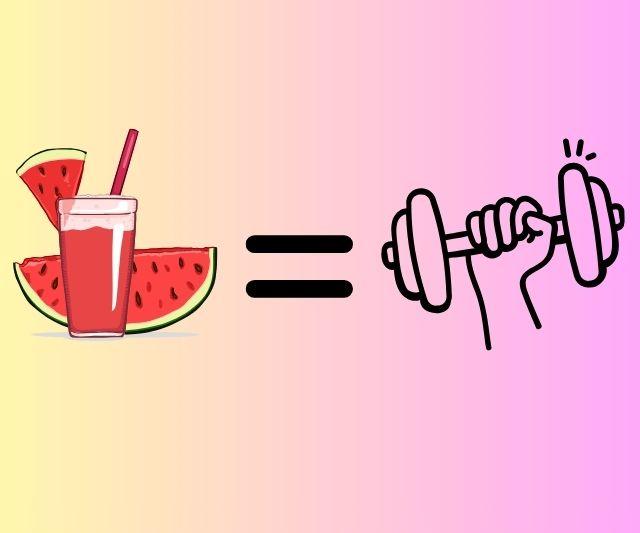
Watermelon contains something called citrulline.
Think of citrulline as a helper that makes our blood vessels relax and widen, allowing more blood to flow through them.
When we have more blood flowing through our vessels, it carries more oxygen to our muscles when we are exercising.
Now, why is this good for workouts and weight loss?
When our muscles get more oxygen, it helps us work out better and longer. It’s like adding more fuel to a car; it can go a longer distance.
So, if you eat watermelon before you exercise, it can help you have a better workout session.
Better workouts mean you use more energy, and using more energy means burning more calories. And burning more calories is what helps us lose weight!
So, in simple terms, eating watermelon before a workout can help you exercise more efficiently and help you in your journey to lose weight.
Also Read: Best Energy Drink For Weight Loss
Downsides of Watermelon for Weight Loss
High Sugar Content
Watermelon is naturally sweet, and this sweetness comes from its sugar content.
Even though it’s natural sugar, consuming watermelon in large quantities can still mean a lot of sugar intake.
This can lead to rapid spikes and drops in blood sugar levels.
For some people, especially those with diabetes or insulin resistance, managing blood sugar is crucial.
When blood sugar drops quickly after a spike, it can also make you feel hungry sooner, potentially leading to overeating.
They Could Lead to Overeating
Watermelon is mostly water and doesn’t have many calories, so some people may assume that they can eat a lot of it.
But eating too much can give you more sugar than you realize, which is obviously not good if you’re trying to lose weight.
Just because it’s healthy or low-calorie doesn’t mean you should eat tons of it.
Always remember: too much of anything can be a problem.
Watermelon Diet Caution
There’s a trendy idea out there called the “watermelon diet,” where people eat nothing but watermelon for several days.
While this might lead to short-term weight loss (mainly because you’re consuming fewer calories and shedding water weight), it’s not sustainable or balanced.
Exclusively eating watermelon deprives your body of other essential nutrients such as protein.
Our muscles require protein and the amino acids it breaks down into for repair and growth.
When the body doesn’t get enough protein from the diet, it starts to break down muscle tissues to meet its amino acid requirements.
This means that, while you might be losing weight on the scale, a big portion of it could be muscle mass.
So when you go back to normal eating, you might gain back the weight you lost and also have less muscle.
Also Read: Is Sparkling Ice Good for Weight Loss?
Tips to Incorporate Watermelon in a Weight Loss Diet
Use it as a Pre-Workout Snack
Watermelon can be an excellent choice as a pre-workout drink. Here’s why:
Sugar Content: Natural sugars in watermelon provide a quick energy boost. This can help you start your workout with a burst of energy.
Citrulline: This amino acid, found in watermelon, aids in improving blood flow. Better blood flow ensures that your muscles get enough oxygen, which can lead to more effective workouts.
High Water Content: Staying hydrated is crucial during workouts to prevent fatigue and muscle cramps. Given that watermelon is about 91% water, it’s a hydrating choice before you hit the gym.
Also Read: Is Gatorade Good for Weight Loss
Have Watermelon Juice in the Morning
Starting your day with watermelon juice can be a strategic choice.
The sugars in watermelon give your body glucose, which is a primary energy source. Having this boost in the morning can help you start your day with energy and alertness.
Consuming the natural sugar from the watermelon in the morning means you have the entire day ahead to utilize this energy.
This is better than drinking juice at night when the body’s energy needs are lower.
If sugars aren’t used for energy, they might get stored as fat, so it’s smart to drink watermelon juice when you’re more active.
Add it to Salads
As you know watermelon is filled with water, which can help hydrate you and add volume to your meals, helping you feel fuller for longer.
While watermelon is hydrating and provides some fiber, it lacks a significant amount of insoluble fiber.
This type of fiber is great for digestion and adds to the feeling of fullness.
By combining watermelon with green leafy vegetables like lettuce, as well as with other veggies like cucumber and tomato, you’re enhancing the salad’s fiber content.
With the combination of water from the watermelon and fiber from the veggies, the salad can work as a natural appetite suppressor.
It helps you feel full without consuming a ton of calories, making it easier to maintain or lose weight.
Also Read: Is Egg Salad Good For Weight Loss?
Alternatives to Watermelon for Weight Loss
Strawberries
Strawberries are remarkably low in calories. A cup of halved strawberries has under 50 calories, making it a delightful snack without the calorie baggage.
They’re packed with vitamins, especially vitamin C, and antioxidants, which are essential for overall health and can help combat oxidative stress.
Strawberries contain dietary fiber which aids in digestion and can help make you feel full, thereby potentially reducing the overall amount you eat.
Cantaloupe
Much like watermelon, cantaloupe has a high water content, ensuring you stay hydrated and feel full.
Cantaloupes are orange because of their beta-carotene content, which is an antioxidant that gets converted to vitamin A in the body, supporting eye and skin health.
Aside from beta-carotene, cantaloupe offers a host of B vitamins, vitamin K, and magnesium.
Apple
Apples provide a sweet crunch that can curb sugar cravings without overloading you with calories.
This soluble fiber in apples slows digestion, helping you feel full. It’s also been associated with supporting healthy cholesterol levels.
Apples are easy to carry and don’t require refrigeration, making them a convenient, on-the-go snack that can deter you from opting for less healthy options.
Oranges
Oranges are another hydrating fruit, ensuring you stay quenched and sated.
A single orange can provide over 100% of your daily vitamin C needs, which is essential for skin health and immune function.
Despite their sweetness, oranges are low in calories and packed with fiber, which can help in weight management.
Honeydew Melons
Like its melon cousins, honeydew is rich in water and low in calories.
Honeydew provides potassium, which can help balance electrolytes, especially post-workout.
Honeydew is a good source of B vitamins, vitamin C, and copper, supporting various bodily functions and overall health.
Also Read: Is Sourdough Bread Good for Weight Loss?
Conclusion
As you can see, watermelon is a weight-loss-friendly fruit because of its low-calorie and high water content.
Make sure to eat it responsibly. Like I said, just because it is a low-calorie fruit, doesnt mean that you can eat them as much as you want and not hinder your weight loss goals.
If you eat it at the right time and use its nutrients such as natural sugars and citrulline at the right time, watermelon can be your ally in your weight loss journey.
FAQ
Does watermelon help you lose belly fat?
No, watermelon alone won’t target belly fat, but it can be part of a balanced diet that promotes overall weight loss.
Will I lose weight if I only eat watermelon for a week?
Likely yes, due to reduced calorie intake, but this isn’t a sustainable or healthy long-term approach.
Does watermelon have a lot of sugar?
Watermelon contains natural sugars, but it’s still relatively low in calories. However, excessive consumption can add up to sugar intake.
What is the 3-day watermelon diet?
It’s a short-term diet where you primarily eat watermelon for three days. It’s meant for rapid weight loss but isn’t recommended for long-term health.
Can I eat watermelon at night?
Yes, you can. However, due to its natural sugar content, it’s best to consume it in moderation, especially if you’re mindful of blood sugar levels.
Is eating watermelon at night good for weight loss?
Eating watermelon at night isn’t the best for weight loss due to its sugar content providing energy that you don’t need when you’re inactive at night. It’s better to consume it earlier in the day.
This post may contain affiliate links which means I may receive a commission for purchases made through links at no extra cost to you. See my disclosure policy for more information.
Rahul is a professional nutritionist certified by the International Sports Sciences Association (ISSA) and a personal trainer certified through the American Council of Exercise (ACE). He has a special interest in the science of nutrition and how it can impact the body.
